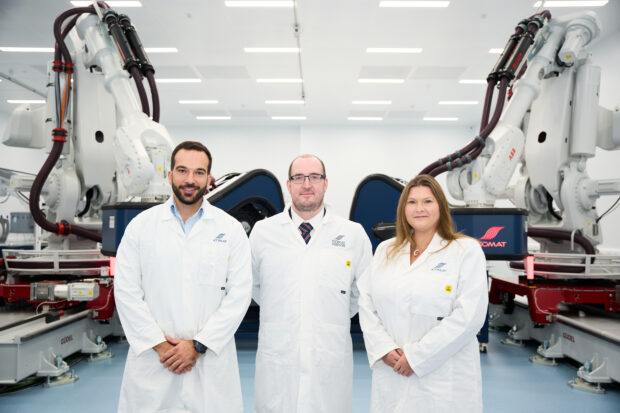The UK’s space manufacturing ambitions have reached new heights with the official opening of the Advanced Composites Manufacturing Enterprise (ACMA) in Hardwick, Gloucester.
The state-of-the-art facility, developed by iCOMAT, a spin-out from the University of Bristol, is expected to create more than 2,000 skilled jobs and place the UK at the forefront of next-generation spacecraft production.
ACMA, supported by £4.8m of funding from the UK Space Agency’s Space Cluster Infrastructure Fund (SCIF), is a vital step towards strengthening the UK’s domestic space capabilities and global competitiveness.
UK Space Secretary Liz Lloyd emphasized the importance of ACMA: “The opening of this space manufacturing facility is a triumph of British ingenuity and evidence of the UK’s commitment to supporting our own space sector.”
“The innovative technologies developed here will support everything from a thriving satellite industry to future deep space missions.”
Changing the future of lightweight spacecraft
The 45,000 square foot factory incorporates iCOMAT’s pioneering Rapid Traction Shear (RTS) technology, a breakthrough technology in the production of composite materials for satellites, rockets and other spacecraft.
RTS allows engineers to build ultra-light, highly efficient structures that are stronger and more sustainable than those made using traditional composite manufacturing techniques.
By enabling significant reductions in spacecraft weight and cost, iCOMAT’s technology directly addresses one of the most important challenges in space: increasing fuel efficiency and payload capacity for missions beyond Earth’s atmosphere.
Dr. Evangelos Gimperudis, CEO and Founder of iCOMAT, explained:
“By leveraging our expertise in advanced materials, we are creating opportunities for the space industry to develop more efficient and sustainable vehicles, while building domestic supply chains and strengthening the UK’s competitiveness in global markets.
“Our team is excited to be fully operational with iCOMAT’s unique patented technology and to engage with the UK space and other industries.”
A collaborative hub for innovation
ACMA is located in the Western Gateway region, a key hub for the UK’s growing space ecosystem, and is strategically designed to foster collaboration between academic institutions, start-ups and global industry leaders.
Construction began in 2023, with a total investment of £8.2 million, including match funding from iCOMAT and more than £800,000 from the European Space Agency’s General Support Technology Program (GSTP).
The facility was opened at an event attended by representatives from the UK Space Agency, the European Space Agency and major international companies including Orbex, Lockheed Martin and Thales Alenia Space.
Guests explored the fully automated factory floor and witnessed a live demonstration of the RTS process in action.
Dual production lines for various space applications
ACMA’s advanced infrastructure includes two dedicated production lines designed to serve multiple space manufacturing markets.
The 2D-RTS line focuses on manufacturing satellite panels, solar array substrates, and other flat or curved components.
The 3D-RTS line, on the other hand, uses high-precision fiber steering technology to enable the production of complex geometries such as propellant tanks for upper stage rockets.
The facility will also operate on an open access model, allowing external partners to utilize RTS technology for their own projects, from retrofitting existing spacecraft to developing entirely new design concepts.
Beyond space: Implications for broader industry
Although ACMA primarily serves the space sector, its composites manufacturing expertise extends to adjacent industries such as aerospace and automotive engineering.
This versatility underscores iCOMAT’s broad mission to revolutionize lightweight design across multiple high-performance markets.
Its opening will strengthen the UK’s leadership in space manufacturing, drive innovation, job creation and sustainability, and mark a decisive moment in the UK’s journey towards a thriving, globally competitive space economy.
Source link

